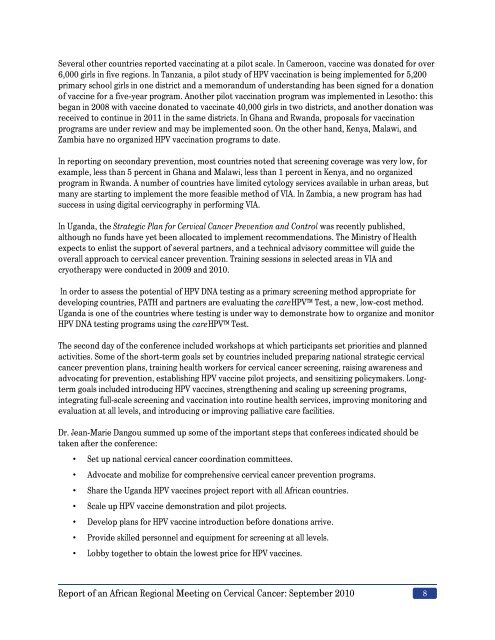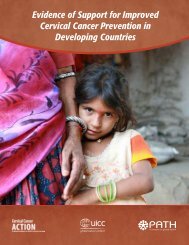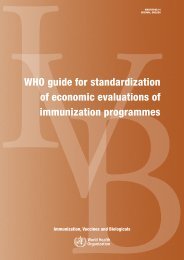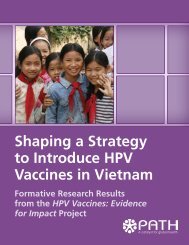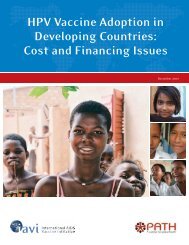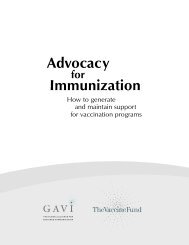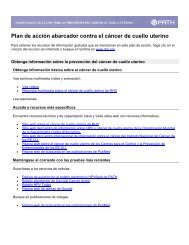Download file, English (1 MB PDF) - RHO
Download file, English (1 MB PDF) - RHO
Download file, English (1 MB PDF) - RHO
You also want an ePaper? Increase the reach of your titles
YUMPU automatically turns print PDFs into web optimized ePapers that Google loves.
Several other countries reported vaccinating at a pilot scale. In Cameroon, vaccine was donated for over<br />
6,000 girls in five regions. In Tanzania, a pilot study of HPV vaccination is being implemented for 5,200<br />
primary school girls in one district and a memorandum of understanding has been signed for a donation<br />
of vaccine for a five-year program. Another pilot vaccination program was implemented in Lesotho: this<br />
began in 2008 with vaccine donated to vaccinate 40,000 girls in two districts, and another donation was<br />
received to continue in 2011 in the same districts. In Ghana and Rwanda, proposals for vaccination<br />
programs are under review and may be implemented soon. On the other hand, Kenya, Malawi, and<br />
Zambia have no organized HPV vaccination programs to date.<br />
In reporting on secondary prevention, most countries noted that screening coverage was very low, for<br />
example, less than 5 percent in Ghana and Malawi, less than 1 percent in Kenya, and no organized<br />
program in Rwanda. A number of countries have limited cytology services available in urban areas, but<br />
many are starting to implement the more feasible method of VIA. In Zambia, a new program has had<br />
success in using digital cervicography in performing VIA.<br />
In Uganda, the Strategic Plan for Cervical Cancer Prevention and Control was recently published,<br />
although no funds have yet been allocated to implement recommendations. The Ministry of Health<br />
expects to enlist the support of several partners, and a technical advisory committee will guide the<br />
overall approach to cervical cancer prevention. Training sessions in selected areas in VIA and<br />
cryotherapy were conducted in 2009 and 2010.<br />
In order to assess the potential of HPV DNA testing as a primary screening method appropriate for<br />
developing countries, PATH and partners are evaluating the careHPV Test, a new, low-cost method.<br />
Uganda is one of the countries where testing is under way to demonstrate how to organize and monitor<br />
HPV DNA testing programs using the careHPV Test.<br />
The second day of the conference included workshops at which participants set priorities and planned<br />
activities. Some of the short-term goals set by countries included preparing national strategic cervical<br />
cancer prevention plans, training health workers for cervical cancer screening, raising awareness and<br />
advocating for prevention, establishing HPV vaccine pilot projects, and sensitizing policymakers. Longterm<br />
goals included introducing HPV vaccines, strengthening and scaling up screening programs,<br />
integrating full-scale screening and vaccination into routine health services, improving monitoring and<br />
evaluation at all levels, and introducing or improving palliative care facilities.<br />
Dr. Jean-Marie Dangou summed up some of the important steps that conferees indicated should be<br />
taken after the conference:<br />
• Set up national cervical cancer coordination committees.<br />
• Advocate and mobilize for comprehensive cervical cancer prevention programs.<br />
• Share the Uganda HPV vaccines project report with all African countries.<br />
• Scale up HPV vaccine demonstration and pilot projects.<br />
• Develop plans for HPV vaccine introduction before donations arrive.<br />
• Provide skilled personnel and equipment for screening at all levels.<br />
• Lobby together to obtain the lowest price for HPV vaccines.<br />
Report of an African Regional Meeting on Cervical Cancer: September 2010 8


